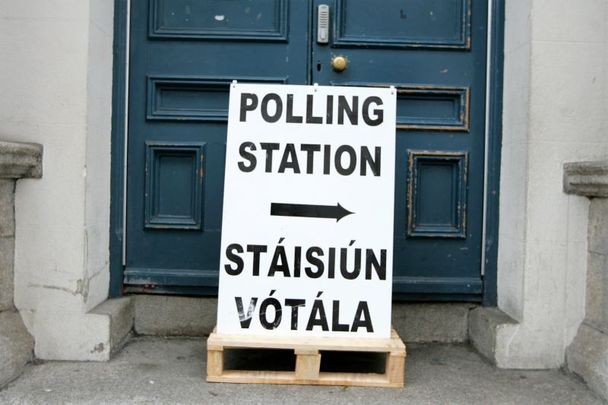Colm Brophy, Ireland's Minister of State for Overseas Development Aid and Diaspora, officially announced the next Global Irish Civic Forum during an event on November 21.
The 2023 Global Irish Civic Forum, the third of its kind, will take place over two days in Dublin in April.
Brophy said in a virtual address to Irish diaspora representatives on Monday that a significant focus will be placed on the matter of Irish diaspora voting rights in Irish presidential elections.
Delighted to launch the Global Irish Civic Forum earlier today, which will be held in Dublin in April 2023. A great gathering of Irish diaspora groups, and a wonderful opportunity to connect and discuss the referendum on presidential voting rights. pic.twitter.com/p3ebr2m2aT
— Colm Brophy (@brophytalks) November 21, 2022
"The question of participation of overseas citizens in our democracy, I believe, will be a particularly important agenda item," Brophy said.
"The current Programme for Government contains a commitment to hold a referendum on extending the franchise in presidential elections to citizens resident outside the state.
"The Diaspora Strategy re-states that commitment.
"Progress has been made, but there’s an awful lot more work to do.
"I want 2023 to be a year when we really stimulate and really advance public debate on a referendum to extend voting rights to our diaspora.
"This Forum will be an important point on our journey as we build a pathway towards this referendum."
After reviewing the efforts that have already been taken, Brophy continued: "There is still work to be done before a date can be set with confidence as to a positive outcome.
"I firmly believe that it is difficult to pass referendums without full engagement with the public on the issues the subject of the referendum.
"I have been involved in a number of referendum campaigns, going all the way back to the 1980s in Ireland.
"If I have learned anything from those experiences, it is that preparation must be thorough; the groundwork must be laid.
"The Irish electorate takes its responsibilities at the ballot box very seriously.
"If we take them for granted, it will be at our peril, and I know that you don't want that, and I don't want that.
"This Civic Forum, this assembly of diaspora representatives, is the ideal forum for us to discuss this issue.
"I want to hear from the diaspora about what we need to do to bring this referendum home.
"I want us to emerge from the forum with a very clear, shared sense of what needs to be done to prepare the ground for a referendum.
"We have come a long way; we do not want to fall at the final hurdle for lack of preparation."
Brophy said that elsewhere on the agenda for the Global Irish Civic Forum 2023 is: implementing the Government’s Diaspora Strategy, 2020-2025; the Emigrant Support Programme; enhanced supports for returning emigrants; youth engagement; legacy of covid; and diaspora networks in the USA and Great Britain.
"This Civic Forum will be a platform for discussion and debate," Brophy said at the end of his remarks.
"It will also be a springboard for implementing the remainder of the Government’s Diaspora Strategy.
"Most of all, however, it will be about connection, conversation, and creative thinking."
Voting in Irish elections from abroad
Unlike people in other countries, Irish citizens who are no longer living in the Republic of Ireland cannot cast votes in Irish elections from abroad.
"Subject to a limited number of exceptions, Irish citizens resident outside the State do not have the right to vote at elections or at referendums held in the State," Ireland's Department of Foreign Affairs says.
This is in relation to Ireland’s Electoral Act of 1992, which dictates that Irish citizens who have left Ireland for no longer than 18 months are still entitled to vote. Thus, Irish citizens living abroad for more than 18 months are not permitted to vote in Irish elections.
There are exceptions for Ireland's Defence Forces personnel and civil servants (and their spouses / civil partners) who are members of missions and who, for the time being, are serving outside the State because of the requirements of their duties.
A 2013 report from the Irish Convention on the Constitution, however, recommended that Irish citizens resident outside of Ireland should have the right to vote in Irish presidential elections.
As such, the Irish government intended to host a referendum on whether or not Irish citizens abroad could vote in Irish presidential elections. The referendum was planned for 2019, but it was ultimately delayed largely due to Brexit, and later, Covid.
While a new date for the referendum has yet to be confirmed, the matter is still of importance to the Irish government. In its Diaspora Strategy 2020 - 2025, the Irish government says it aims for “greater engagement of our citizens outside the State in our democracy will strengthen the connection between the diaspora and Ireland.
“Diaspora participation in presidential elections will strengthen the connection between the Presidency, the highest office in the State, and the diaspora.”
To facilitate this engagement, the Irish government plans to “hold a referendum on extending the franchise in presidential elections to citizens resident outside the State.”
In April 2020, Billy Lawless, then Ireland's Minister for the Diaspora, penned a letter to the Taoiseach urging the referendum to go ahead in 2021.
“We can’t have a Republic with two types of citizens – a first class with the right to vote, and a second class with no rights at all," Lawless wrote, adding that Ireland’s electoral system “now denies the vote to well over a third of all Irish citizens.”
Earlier this year, Minister Brophy signaled that a referendum on the matter will happen before 2024.




Comments